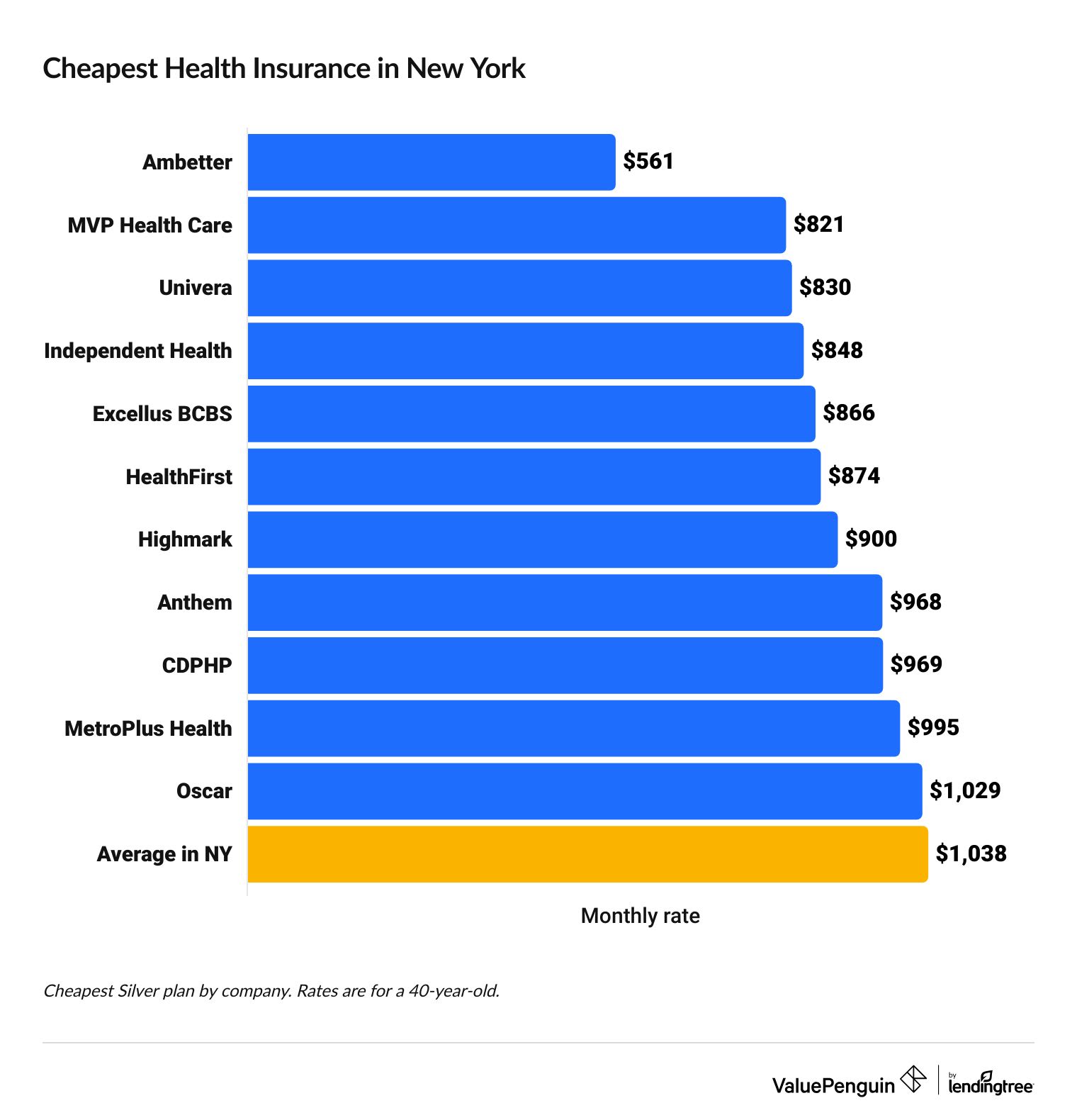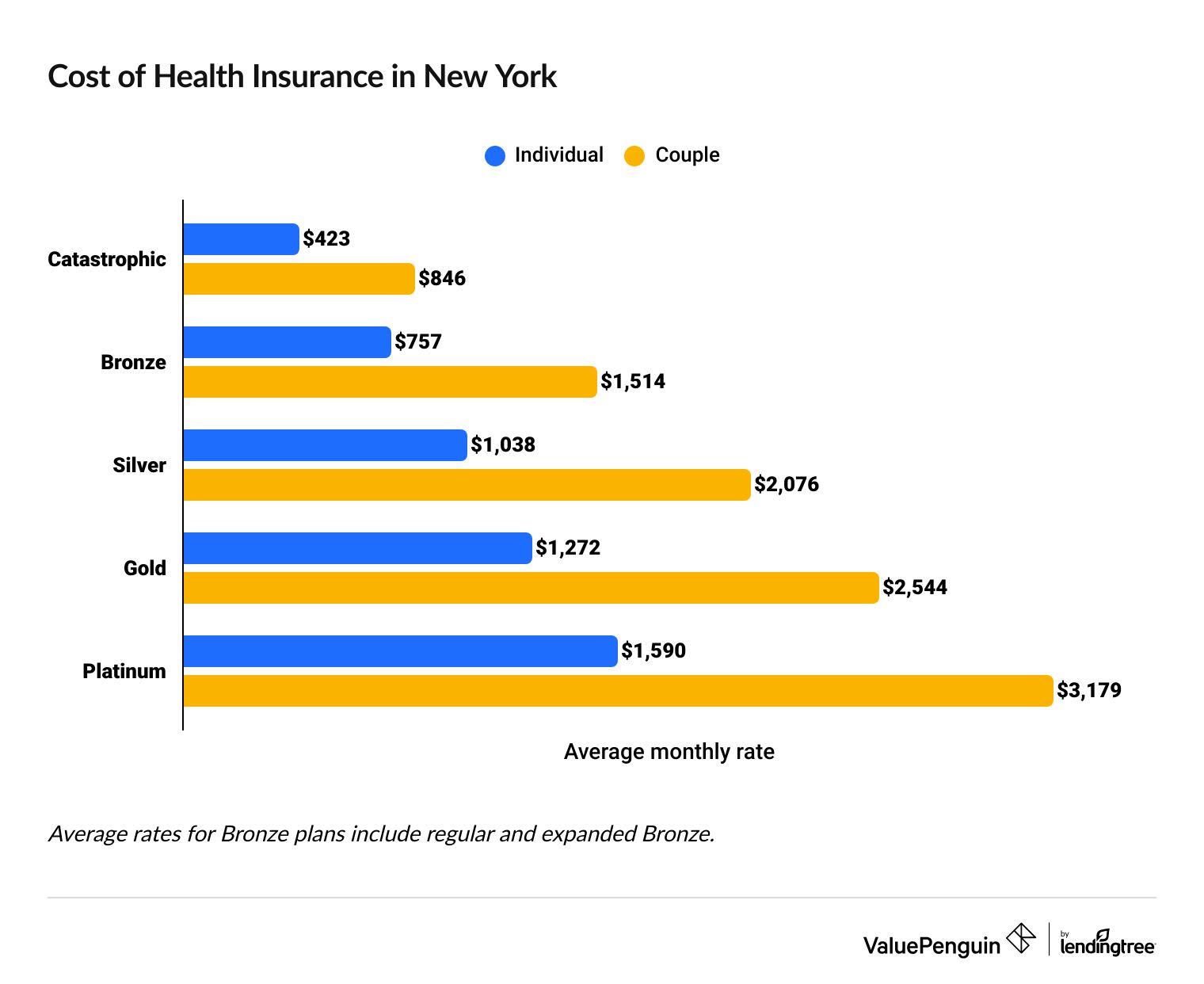Best and cheapest health insurance in New York
Cheapest health insurance companies in New York
Fidelis Care has the cheapest health insurance in New York, including in New York City. Silver plans start at $561 per month before discounts.

Find Cheap Health Insurance Quotes in New York
Affordable health plans in NY
Company |
Cost
| |
|---|---|---|
| Fidelis Care | $561-$925 | |
| MVP Health Care | $821-$1,134 | |
| Univera Healthcare | $830-$846 | |
| Independent Health | $848-$856 | |
- Fidelis Care's cheapest Silver plan costs $561 each month. That's about half the average for a Silver plan in New York State.
- Fidelis Care also sells the most affordable health insurance in all five counties of New York City.
Best health insurance companies in New York
Anthem has the best health insurance for most New Yorkers.
Anthem has a rating of 4 out of 5 stars from HealthCare.gov, which is among the best in the state. These ratings measure factors like customer satisfaction, quality of care and plan management. And most people in New York can get an Anthem plan.
As a Blue Cross Blue Shield (BCBS) company, Anthem gives its customers access to the largest network of doctors in the country.
Best-rated health insurance companies in New York
Company |
Editor rating
|
ACA rating
|
|---|---|---|
| Anthem | 4.0 | |
| Independent Health | 5.0 | |
| Ambetter from Fidelis Care | 4.0 | |
| HealthFirst | 4.0 | |
| Excellus BCBS | 4.0 |
Find Cheap Health Insurance Quotes in New York
If you live in western New York, Independent Health is the best insurance company.
Independent Health only sells plans in seven counties in the western part of New York, so it's not an option for most people in the state.
Independent Health is the only company in New York with a perfect 5-star rating from HealthCare.gov. And its plans tend to be cheap, with Silver plans starting at $848 per month.
Best health insurance in NYC: MetroPlus Health
MetroPlus is the best health insurance company for people living in New York City.
Not only does the company sell plans in all five counties that make up NYC, but it also helps you save on your health care bills. If you get a Silver plan from MetroPlus, you'll pay up to $2,100 each year before your plan starts to help pay for your medical bills. That's much lower than the average deductible in NYC, which is nearly $4,700.
MetroPlus Silver plans start at $995 per month. Fidelis Care sells the cheapest health insurance in New York City, but its plans usually have higher deductibles than plans from MetroPlus. Choosing a plan with a low deductible means your coverage starts sooner and can help you save money overall.
How much does health insurance cost in New York?
Health insurance in New York costs an average of $1,038 per month, but you could pay $247 per month after discounts.
Find Cheap Health Insurance Quotes in New York

- Platinum and Gold plans have expensive monthly rates, but you pay less when you visit the doctor or get a prescription filled. Bronze plans have cheap monthly rates and high costs when you get medical care.
- Silver health plans have middle-of-the-road rates and costs when you see the doctor. That makes Silver plans best for most people who have average medical needs.
In New York, your health insurance rate won't change because you get older.
Your rate also won't change if you smoke or use other tobacco products.
Get cheap medical insurance in NY
Health insurance costs $247 per month in New York if you can get discounted rates because of your income.
More than seven out of 10 New Yorkers who shop for health insurance on NY State of Health, New York's state health insurance marketplace, get a discount.
The size of your discount depends on how much you earn each year and the number of people in your household. You can use a subsidy calculator to find out how much you could save.
You're usually eligible for discounted rates if you earn between $15,060 and $60,240 per year as a single person or $31,200 to $124,800 for a family of four. Discounts apply to Bronze, Silver, Gold and Platinum plans bought through the New York health plan marketplace, called NY State of Health.
You can't use subsidies on Catastrophic plans. And if you can get Medicaid, you can't get marketplace subsidies.
Cheap New York health insurance plans by city
Fidelis Care has the cheapest health insurance in NYC.
Fidelis Care has the most affordable plans in all five NYC boroughs. Fidelis Care also has the cheapest rates in other large New York cities like Buffalo, Yonkers, Rochester, Syracuse and Albany.
Cheapest health insurance by NY county
County | Cheapest Silver plan | Monthly rate |
|---|---|---|
| Albany | Fidelis Care Silver Dep25 | $661 |
| Allegany | Fidelis Care Silver Dep25 | $561 |
| Bronx | Fidelis Care Silver Dep25 | $881 |
| Broome | Fidelis Care Silver Dep25 | $645 |
| Cattaraugus | Fidelis Care Silver Dep25 | $561 |
Cheapest Silver plan with rates for a 40-year-old
Find Cheap Health Insurance Quotes in New York
Fidelis Care Silver is the cheapest Silver health plan for roughly 98% of the New York state population.
Best health insurance by level of coverage
The best health insurance policy for you will depend on your medical needs, financial situation and plan availability in your area.
When deciding on the right plan, look for the plan tier that offers the right amount of coverage for your medical needs.
Platinum plans: Best for expensive medical treatment
| Platinum plans pay for about 90% of your medical care. |
Consider a Platinum health plan if you think you'll need a lot of expensive medical care in the coming year. For example, a Platinum plan may be a smart choice for someone who has recently been diagnosed with cancer.
Platinum plans have expensive monthly rates. However, you won't pay much when you visit the hospital. That's because Platinum plans typically have a low deductible and a low limit on how much you'll pay for medical care in a single year, called an out-of-pocket maximum.
Platinum plans cost $1,590 per month, on average, in New York.
Gold plans: Best if you have ongoing medical needs
| Gold plans pay for about 80% of your medical care. |
A Gold plan is a good choice if you have to visit the hospital often. Gold plans have expensive monthly rates and low costs you pay when you get medical care.
Gold plans typically have low deductibles and cheap copays and coinsurance.
In New York, Gold plans cost $1,272 per month, on average.
Silver plans: Best for most people
| Silver plans pay for about 70% of your medical care. |
Silver plans have average monthly rates and middle-of-the-road costs when you go to the doctor. This makes Silver plans a smart choice for most people because they offer a good balance between rates and other costs you're responsible for when you get medical care.
In New York, you'll pay an average of $1,038 per month for a Silver plan.
Bronze plans: Best if you're healthy and you can afford large, unexpected medical bills
| Bronze plans pay for about 60% of your medical care. |
A Bronze plan may be a good option if you're healthy and rarely visit the doctor. These plans have cheap monthly costs. However, you'll pay a high portion of the bill when you visit the doctor.
If you get seriously sick or injured with a Bronze plan, you could pay thousands of dollars before your coverage starts. That makes Bronze plans risky. You should only consider this coverage tier if you're healthy and you have enough money in your savings account to cover a large, unexpected medical bill.
Bronze plans cost an average of $757 per month in New York.
Catastrophic plans: Best as a last resort
Catastrophic plans have cheap monthly rates but don't pay for much of your health care. They're an option if you can't afford anything else. But you should be aware that you'll have to pay a large share of your health care bills if you get sick or hurt.
You can only buy a Catastrophic plan if you're under 30 or otherwise qualify for an exemption. Also, keep in mind that you cannot use premium tax credits to lower the monthly bill for a Catastrophic plan.
You'll pay an average of $423 per month for a Catastrophic plan in New York.
Free health insurance for New York residents who earn low incomes
New Yorkers have access to two types of free government health insurance: Medicaid and Essential health plans.
If you make too much for free health insurance, you may be eligible for extra discounts, called cost-sharing reductions (CSRs), if you have a Silver health plan.
Medicaid: Best if you earn a low income
Medicaid provides free government health insurance for New Yorkers who make about $21,000 per year or less as a single person or $44,000 per year or less for a family of four. The eligibility limits are higher for pregnant women and children.
Essential Plan: Free health insurance in New York
You can get free health insurance in NY through the Essential Plan if you make less than $37,650 per year as a single adult or under $78,000 per year as a family of four.
The Essential Plan is the best way to get affordable health insurance if you earn too much to qualify for Medicaid and don't have insurance through a job. You can sign up any time of the year, even if it's not open enrollment.
New York is just one of three states to offer this type of coverage to residents. These plans, called Basic Health Programs, help people who don't qualify for Medicaid but who would struggle to pay for regular health insurance.
Use cost-sharing reductions for cheaper medical care
If you have a low income and a Silver plan, you might be able to get an extra discount that lowers the cost of your medical bills. These discounts are called cost-sharing reductions, and they lower the deductible, copay, coinsurance and out-of-pocket maximum on Silver plans.
To qualify, you have to make between $15,060 and $37,650 as a single person or $31,200 and $78,000 as a family of four. You can likely get an Essential Plan, though, and not have a monthly rate for health insurance. If you qualify for cost-sharing reductions, check to see if you're eligible for an Essential Plan.
Is health insurance getting more expensive in New York?
On average, New York health insurance rates went up by 19% between 2024 and 2025.
Silver and Gold plans had the biggest increase, costing 19% more each month for 2025 compared to 2024. Bronze plans rose in price by an average of 17%, and Platinum plans are 18% more expensive.
Tier | 2024 | 2025 | Change |
|---|---|---|---|
| Bronze | $646 | $757 | 17% |
| Silver | $873 | $1,038 | 19% |
| Gold | $1,067 | $1,272 | 19% |
| Platinum | $1,343 | $1,590 | 18% |
Monthly costs are for a 40-year-old.
Catastrophic plans weren't available in New York for 2024, but they are for 2025.
Obamacare in New York
You can apply for Obamacare plans in New York by going to NY State of Health, the state's health insurance exchange.
Obamacare or Affordable Care Act (ACA) plans offer special consumer protections. For example, plans can't charge you a higher rate or deny coverage based on your health. In addition, all plans have to cover specific services, also called essential coverage.
Benefits that all NY Obamacare plans offer
- Outpatient care
- Emergency care
- Hospital care
- Care for pregnant women and newborns
- Preventive, wellness and ongoing disease services
- Prescription drugs
- Coverage for babies
- Laboratory services
- Rehabilitation services and devices
- Services for mental health and substance use disorders
Every ACA plan also has a limit on the amount you'll pay for medical care each year, called an out-of-pocket maximum.
Short-term health insurance in New York
New York bans short-term health insurance because short-term plans don't have to offer essential benefits such as maternity care, mental health care or prescription drugs.
New York state law requires all health insurance plans to offer these benefits.
Frequently asked questions
What's the best cheap health insurance in New York?
Anthem has the best health insurance in New York, at $968 per month before discounts on average. But Fidelis Care sells cheaper plans, starting at $561 per month.
What is the most affordable health insurance in New York City?
Fidelis Care has the cheapest health insurance in NYC. Silver plans start at $561 per month before discounts. But MetroPlus sells the best plans in NYC, with Silver plans starting at $995 per month.
How can I get cheap health insurance in New York?
Health insurance tax credits, also called subsidies, can reduce how much you pay for health insurance based on your income and family size. In New York, there is also the Essential Plan, which provides free health insurance for people who have low incomes but don't qualify for Medicaid.
Is $200 a month expensive for health insurance in New York?
No, in New York, a $200 health insurance plan is very cheap. That's 81% cheaper than the state average of $1,038 per month. You could get health insurance for $200 per month if you qualify for discounted rates called subsidies. About 71% of shoppers in NY qualify, and how much you pay will be based on your income.
Methodology
New York health insurance rate data for 2025 is from NY State of Health, New York's state marketplace for health insurance. ValuePenguin used the data from NY State of Health in calculations to average rates across multiple factors such as plan tier, county and family size. Rates are based on a 40-year-old with a Silver plan, unless otherwise noted.
The cost for plans with subsidies is from Centers for Medicare & Medicaid Services (CMS) data for everyone who shopped for a plan during 2024 open enrollment and got advance premium tax credits (APTCs) on their monthly bill.
ValuePenguin chose the best health insurance in New York by reviewing each company's rates, coverages, customer service and unique features. Based on the data, our experts gave each company a ranking from 1 to 5 stars.
Other sources include KFF, the New York State Department of Health and S&P Global Capital IQ.
Editorial note: The content of this article is based on the author's opinions and recommendations alone. It has not been previewed, commissioned or otherwise endorsed by any of our network partners.







